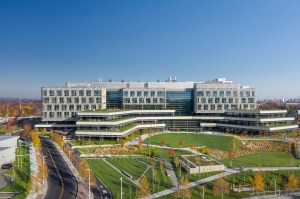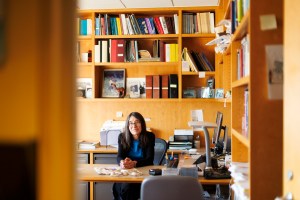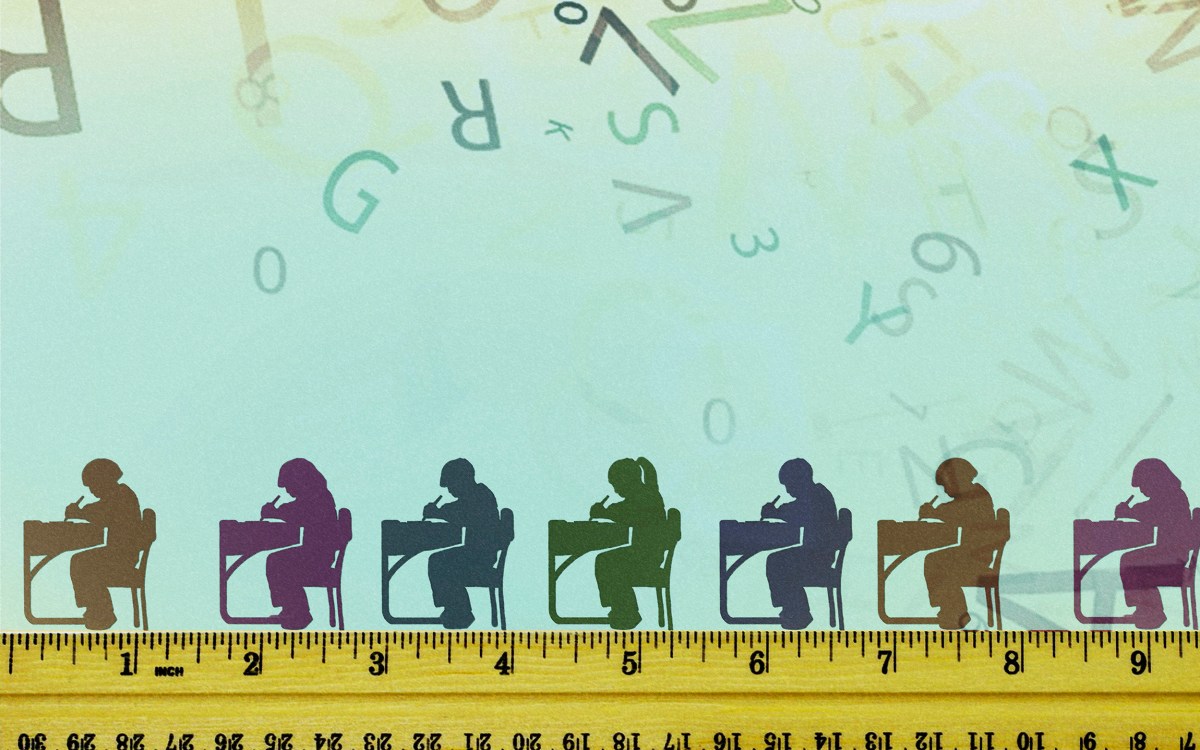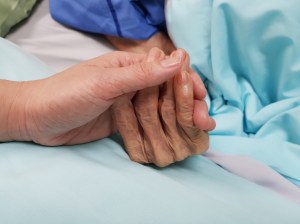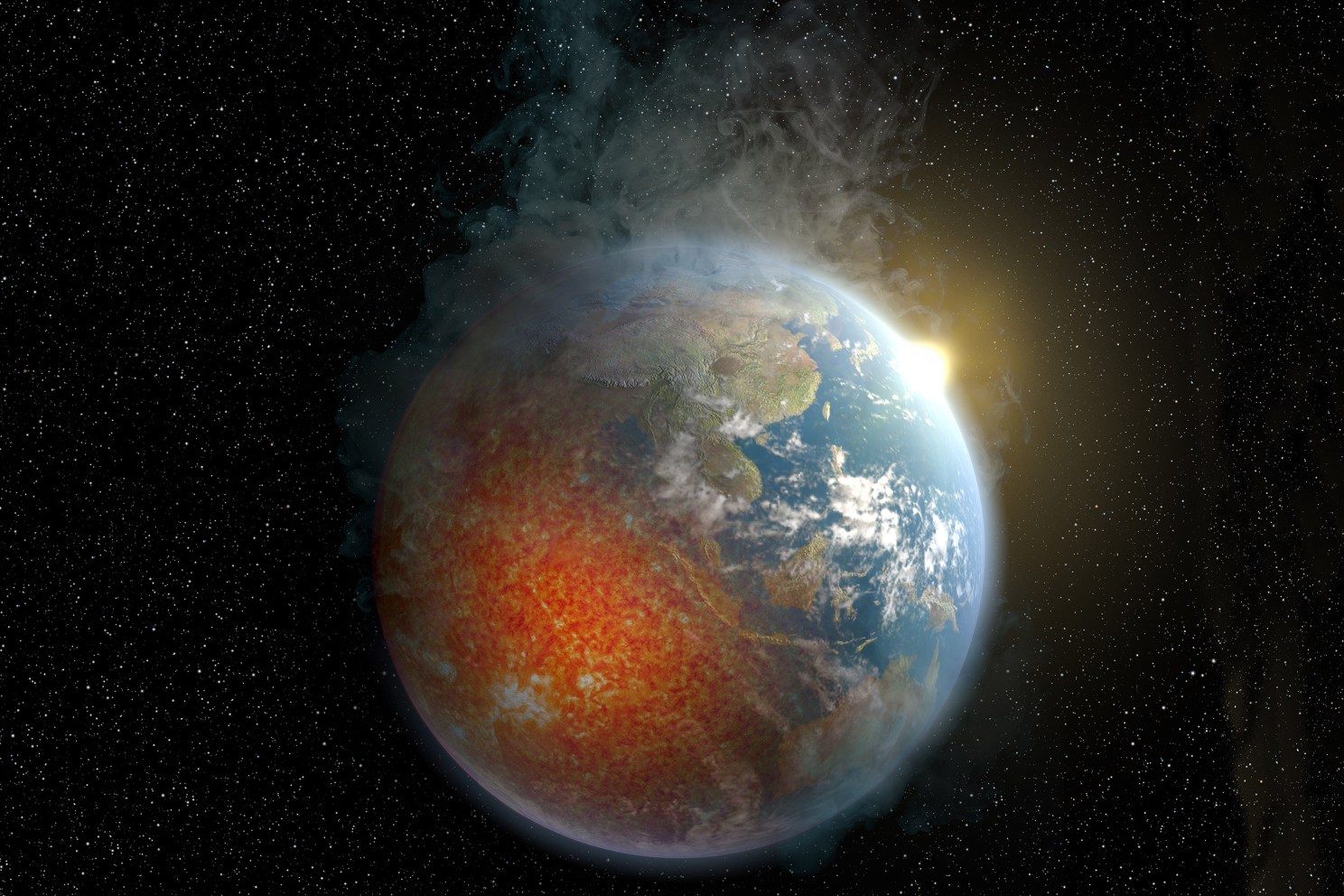
‘Harvard Thinking’: Climate alignment is no easy task
Experts at the Salata Institute outline tensions between global and local priorities
As temperatures rise, countries need to collaborate to reduce carbon emissions and mitigate global warming. Robert Stavins has attended the last 16 Conferences of the Parties (COPs), a U.N. initiative that convenes nations to figure out how to do this. So far, he is encouraged by those efforts.
“Emissions have been flat to declining in the wealthy countries of the world,” said Stavins, the A.J. Meyer Professor of Energy and Economic Development. However, emissions are still increasing in areas where large economic development has taken place, which tend to be poorer, developing countries. Their economic progress may be at odds with mitigation efforts.
“The [points raised] are critical for Africa,” said Emmanuel Akyeampong, the Ellen Gurney Professor of History and Professor of African and African American Studies. “Our resources are often mineral resources, either oil and gas or precious minerals, and these lie at the core of our developmental strategies or agendas. So how do we use that to develop in ways that do not take away from the global progress that is being made?”
Caroline Buckee, a professor of epidemiology at the Chan School of Public Health, said that for the people already experiencing new levels of extreme temperatures, adaptation research is critical.
“There’s this tension, I think, between the big global climate models and the reality that managing the actual human impact of climate change needs to be local, and it needs to be grounded in good evidence,” Buckee said.
In this episode, host Samantha Laine Perfas is joined by Stavins, Akyeampong, and Buckee to discuss the challenge of meeting global and local priorities when it comes to climate change.
Transcript
Caroline Buckee: There’s this tension, I think, between the big global climate models and the reality that managing the actual human impact of climate change needs to be local, and it needs to be grounded in good evidence.
Samantha Laine Perfas: As the planet gets hotter, the world is looking for ways to both mitigate the effects of climate change and adapt to the changes that are already here. It’s difficult. It’s an international issue that requires cooperation, but that’s tricky when some countries are a lot richer than others and global and local needs can vary greatly. So, what do we do when the long-term need for cooperation is overshadowed by short-term interests?
Welcome to “Harvard Thinking,” a podcast where the life of the mind meets everyday life.
Today, I’m joined by three guests from the Salata Institute, an interdisciplinary Harvard initiative that works on both adaptation and mitigation efforts. Our first guest:
Rob Stavins: Rob Stavins. I’m a professor at the Harvard Kennedy School.
Laine Perfas: He’s an economist who directs the Harvard Environmental Economics Program and the Harvard Project on Climate Agreements. And he’s a principal investigator on a research cluster tasked with reducing global methane emissions. Our next guest:
Buckee: Caroline Buckee. I’m a professor of epidemiology at the Harvard Chan School of Public Health.
Laine Perfas: She co-founded and co-directs Crisis Ready, a platform created to deal with crises related to extreme weather events. She’s also the co-principal investigator for a research cluster in South Asia. And finally:
Emmanuel Akyeampong: Emmanuel Akyeampong. I’m a professor of history and of African and African American studies.
Laine Perfas: Previously, he was the faculty director for the Center for African studies and is also the co-principal investigator for a research cluster in the Gulf of Guinea.
And I’m Samantha Laine Perfas, your host and a writer for the Harvard Gazette. Today, we’ll talk about climate change and the tension between global objectives and local challenges.
Rob, I want to start with you because you’ve attended the last 16 Conferences of the Parties, or COPs, which are annual gatherings started by the United Nations to discuss climate change. I’m wondering if you’ve noticed any progress on climate change since you’ve been going.
Stavins: If by progress on climate change, what you mean are emissions reductions below what they ordinarily would have been, then the answer is yes, largely in the OECD [Organisation for Economic Co-operation and Development] countries, the wealthy countries of the world. To some degree, that’s because of policy, mainly in the European Union, but largely it’s because of the fact that energy comes at a price and therefore there’s an ongoing incentive in a market economy to render those economies less energy-intensive over time, and therefore less carbon-intensive. And so emissions have been flat to declining in the wealthy countries of the world.
Where emissions are increasing is where essentially there’s been relatively rapid economic development. So in the large emerging economies: China, India, Brazil, Korea, South Africa, Mexico, and Indonesia, principally. Now we applaud that in a sense because that’s as a result of the process of economic development, but that’s where the emissions are increasing. And so what the Conference of the Parties and the international negotiations are often about is to some degree conflicts between those two sets of countries trying to think about how to address the problem, but do it in a way that does not retard economic development of developing countries.
Akyeampong: Thank you, Rob, and the points you raised are critical for Africa. You talk about how to develop economically, especially in regions like Africa, in ways that do not take away from the advances we are making in global greenhouse emissions. Our resources are often mineral resources, either oil and gas or precious minerals, and these lie at the core of our developmental strategies or agendas. So how do we use that to develop in ways that do not take away from the global progress that is being made? Communities, civil societies, they are aware that government capacity is weak, and so we are all thinking creatively about how communities and civil societies can be drivers of adaptation in ways that do not necessarily wait on government.
Buckee: So I guess we’ve gone from the kind of global governments and the COP level, Emmanuel brought it down to the communities that he’s working with in West Africa. And in my work, I come at it very much from the human level, so the human scale of communities and populations affected and specifically in relation to health. How do people experience climate change in their lived-in environment and in relation to their ability to provide for their families and stay healthy? And what does that mean for our understanding of how health systems have to change, and what we should expect in the coming years? And I think one of the main things that I would like to convey to your audience, Sam, is that for many of these things we actually don’t have good mechanistic underpinnings for what climate change will do to the health of communities, to the health of our bodies. And so we’re not going to be prepared to take care of people as things get worse. And so there’s this tension, I think, between the big global climate models, the big financial models for how we deal with it, and the reality that managing the actual human impact of climate change needs to be local and it needs to be grounded in good evidence. The goal is to really think about adaptation in a community-led way to make sure that anything that we do is sustainable and is going to support communities.
Stavins: So Caroline raised an important distinction implicitly, and that is that she’s focusing, as her project does, on adaptation, on impacts, and how to deal with those impacts. And adaptation is fundamentally from a policy perspective, appropriately a local issue. It’s not an issue necessarily for international cooperation at all, although there is an adaptation fund that has no money under the Paris Agreement. But it really belongs at the national, or in the case of the United States, at the state or city level, because that’s where the impacts are.
Climate change, however, if we’re looking at it in terms of the emissions, then we have to recognize that it doesn’t matter where the emissions come from. A ton of CO2 from Boston and Beijing has the same effect on the atmosphere and on the global climate, even though the impacts on different parts of the world vary. And that means something very important economically and therefore politically, namely that any jurisdiction that takes action to reduce its emissions, essentially the costs of going from coal to petroleum to natural gas to renewables, greater energy efficiency, and the like, it incurs those costs; but the benefits of its actions are distributed globally. And if you think of the basic geographic arithmetic of that, it should be obvious that for virtually any jurisdiction in the world, the direct climate benefits it receives from its actions will be less than the cost that it incurs.
From an economic perspective, therefore, it’s not surprising that countries have not taken greater action. And that’s why the highest level of effective governance needs to be taking a key role. And it’s also why, unfortunately, international cooperation, to some degree, is necessary. That’s why the Paris Agreement, the annual Conference of the Parties, that’s why they’re important, is on the emissions reduction side, not on the side of adaptation. It’s interesting to see how the economics of it all wind up pushing countries to work together — or not, I guess — to reduce emissions. But there doesn’t seem to be as big of a push for funding adaptation efforts, namely, because they’re written off as a local problem. Caroline, did you have something you wanted to say about that?
Buckee: So there’s a very glaring exception, I think, which is pandemics. So infectious disease transmission, it’s obviously a local health issue, but it definitely has global ramifications, as we’ve seen with the COVID-19 pandemic. And to the extent that climate change does have direct impact on the probability of infectious disease threats that will spread very quickly around the world, potentially, I think there is actually a global governance issue to do with how we think about infectious-disease surveillance and strengthening pandemic preparedness in a way that is going to protect everybody.
And then the other thing I would say is that while solutions and adaptation are local issues and require local solutions, there are really important learnings across communities. For example, between Global South communities, where they may not be facing the exact same solutions, or they may not be able to develop the same solutions, but they are facing similar issues. And so there is a generalizability and an importance, I think, in sharing experiences and lessons learned around adaptation on a global level, as well as potentially coming together as a force to lobby for more equitable distribution of finances.
Akyeampong: And Rob, I don’t disagree with your observation that adaptation is fundamentally a local and a national issue. But I wanted to provide a perspective from Africa. So adaptation also comes down to two important resources: one is technology, the other is funding, and both often tend to be scarce in Africa, realities that are historically shaped, and I think it is important that we don’t forget that. I was in Kinshasa in DRC [Democratic Republic of Congo] in January 2023. It was my first visit, and things struck me very powerfully. One of my hosts is also the largest palm oil plantation owner in DRC. He complained I stayed too short for us to do two experiments. One, he wanted to take me on a boat ride down the Congo for me to see the rate at which trees are being felled. And two, he wanted us to sit one evening at the entrance of the main road that enters into Kinshasa to count the number of trucks or lorries that come laden with charcoal for the use as domestic fuel. For him, one of the critical needs in DRC is rural electrification because if not, the trees and the forest are gone. So where do we place something like this in a country where government is weak, which still produces 70 percent of the cobalt that comes to make our electric car batteries?
So the DRC is just one example of the anomaly of these clear definitions that we make. We are in a ship, the ship is sinking. It doesn’t matter whether you are in first class or third class. And we need to think in ways that save the ship and everybody on the ship. I know that when we talk about adaptation and funding everybody gets a little heated up, but I just wanted to put this perspective on and maybe even pulling you along with us to West Africa as we speak to governments about adaptation and mitigation.
Laine Perfas: Emmanuel, you mentioned that sometimes when we talk about adaptation and funding, people get heated. I do want to explore that a little bit, so sorry if it gets a little spicy in here, but one of the things that I was noticing in reading about this issue is that with adaptation and looking for solutions, it does make sense that it would be localized, because every community is different and the ways that they need to adapt are different. But when we talk about the funding of adaptation efforts, it gets a little tricky because if some of the richer, more developed countries are the ones responsible for the climate crisis as it stands, is there a responsibility there to help fund those efforts in poorer countries?
Stavins: So first of all, may I say in this whole history of climate negotiations there was very little attention to adaptation. Indeed, when I first got involved in all this as an environmental economist and started working on climate change, it was only economists who would say we also ought to be looking at adaptation. And we were roundly condemned by governments around the world, by NGOs, environmental advocacy groups, because, “That’s throwing in the towel. You’re just saying that because you don’t want to reduce fossil fuel use.” However, finally, with the Paris Agreement, adaptation came to be recognized as important because it was realized that, you know, emissions could go to zero tomorrow morning, there’s still going to be climate change over the next 100-plus years with CO2 having a half-life in the atmosphere of over 100 years. And a fund was set up which has not been populated with money.
However, something else happened that may turn out to be of significance and goes to the heart of your question about responsibility. And that is that there are some impacts which cannot be adapted for. Now, the poster child is obviously a small island state for whom climate change is not just an increase in cost, but is existential. And so, because of this, a new track started in the negotiations in Poland, I think it’s about, probably now, nine years ago, that came to be referred to as loss and damage. The loss and damage fund, right now it’s about $700 million. Now that’s great, but the demand side on loss and damage is estimated that it’s going to be in the trillions of dollars. So the supply right now is less than a half of percent of what the demand will be. So you could ask the question, and I’ll finish with this, Sam: Is the loss and damage fund simply an empty shell? Or is it the first step toward an equitable sharing for the burden of climate change among countries of the world? I’m not at a high enough pay grade to be able to answer that question.
Laine Perfas: That’s why we have you!
Stavins: And I think it’s too soon to answer that question. Anyone that answers that question is operating from ideology, not from empiricism. Because we don’t know.
Buckee: Perhaps I’m too in the weeds here, but when it comes to calculating loss and damages, I work with surveillance data and we try to estimate the most basic public health, outcome, which is death. You cannot accurately estimate how many people die from a cyclone, for example, right now. It’s very challenging once you get into the weeds of what you’re actually calculating and how that would work. And one of the reasons for that is that if you use something like excess mortality, so you look at a baseline and then you say, OK, this extreme weather event, which we believe may be related to climate change, how many people have died from this extreme weather event? Of course, there’s the people that die from high winds or drowning. That’s a tiny fraction of the people that actually die because there’s this long tail after the fact where people don’t have access to primary care or they’re on electricity-dependent medical devices or a condition is diagnosed late and so they die much later. And we still don’t have the fundamental methods or access to the correct data on the right scale to make those measurements. And so, I think that the whole loss and damages conversation is really interesting because it’s just unclear to me how you would ever start to do this in a reasonable, rational way.
Stavins: So Caroline, I find that very interesting and very compelling as well. But I suggest you be careful because what you just said would be a quotation dear to the hearts of people in the wealthy parts of the world who have been opposed to the loss and damage fund, who don’t want to see the transfer of funds, who say that it’s just going to be money given out for no particular purpose, it’s going to go to corruption, on and on. You’re honest and I think that’s great, but be careful.
Buckee: It’s complicated, but it’s a science question and it’s really important to make sure that we’re clear with what the scientific underpinning of this stuff is.
Stavins: I agree. Absolutely. Absolutely.
Akyeampong: I’ve been following conversations about loss and damage, and the last two COPs saw the needle move forward a bit. I particularly like the incorporation of technology, because I think technology is one of the major deficits when it comes to Africa, in addition to funding. I think one of the challenges, especially in Africa, is how often these processes and development writ large are often pursued at the level of state relations. In July, when we traveled all over, we saw communities heavily affected by climate change. We also see weak local government and weak central government. So how we work out procedures that communities affected can access loss and damage I think would be very important.
Buckee: Can I just say one more thing on this? While I understand that saying it would be complicated to calculate may be risky, I would point out that at least in the case of these extreme weather events, we are almost certainly underestimating mortality in most cases because of this long tail, which mean that people aren’t going back to where they were in terms of their health and productivity after disasters. So it doesn’t abdicate countries from providing finances for loss and damages. It just means that we need to figure out how to calculate it effectively because my hunch is that it would be easy to underestimate the impact.
Laine Perfas: As we kind of wrap up this conversation, I guess what I want to leave people with is, what’s on the horizon that we all need to be thinking about, from your perspectives? And also, where are you all the most encouraged that we are progressing in this really complicated issue?
Stavins: Should I be positive because the economists are always being accused of the dismal science and that we’re so negative? So let me say something positive where I see hope. And that is that people have asked me, what was the most important development at COP 28? Last year, the year before last, I should say, at COP 27 in Sharm el-Sheikh, I wrote that the most important development took place 6,000 miles away in Bali, Indonesia, when U.S. President Joe Biden and China President Xi Jinping met on the sidelines of the G20 summit in Bali, Indonesia, and they engaged in a three-hour conversation, which among other topics signaled the beginning, the renewed cooperation of China and the United States on climate change. But then for various reasons, we hadn’t seen the fruition of that. But then, this year, just two weeks before COP 28 in Dubai, 8,000 miles away, near San Francisco in Sunnylands, California, the same two heads of state met, and when they met, demonstrated renewed cooperation and co-leadership between these countries. Now whether or not that’s going to survive the real differences these two largest economies in the world have if China and the U.S. play a co-leadership role as they did, we’re going to see, in my opinion, much more fruitful progress in the international negotiations, which is not sufficient, but in my view is at least necessary.
Akyeampong: I am encouraged by progress we’ve made on loss and damage. I’m encouraged by the appreciation that the sharing of technology is an important part of how we respond to climate change. The path we are on is a path that began about 100 years ago when we turned to fossil fuels as our source of energy. We’ve had a COP 28 in a city built by oil wealth. We walked away without any firm commitment to the phasing out of fossil fuels. I worry about things like that. I think we find ourselves in a place where we need to rethink lifestyles globally, especially in the developed world, and the implications for how we live and the impact that has on nature and the environment.
Buckee: I would echo Emmanuel’s concerns about the world order as it stands and the possibility for making genuine change in terms of the incentives of capitalism with respect to natural resources and income inequality, as well as political instability. I think all of these things really threaten progress for adaptation strategies and mitigation. The positives that I see largely relate to people and communities. I think that now we have technology which democratizes education, which allows for rapid communication through WhatsApp or whatever means between people. I think there is power in the technologies that we can use to engage communities and help them solve their own problems. And I think that comes at the same time as we’ve seen real efforts to decolonize some of the academic work that we do, especially around global health. The importance of having community-led sustainable interventions. And for me, that transition, as well as the technologies that we have to start to bring people together, are some of the reasons I have to be hopeful, at least in a very moderate way.
Laine Perfas: Thank you for joining me for this conversation.
Akyeampong: Thank you very much, Rob, Caroline, Sam. It’s been a pleasure.
Laine Perfas: Thanks for listening. To find a transcript of this episode, as well as our other episodes, visit harvard.edu/thinking. This episode was hosted and produced by me, Samantha Laine Perfas. It was edited by Ryan Mulcahy, Simona Covel, and Paul Makishima, with additional production support from Christy DeSmith, Tegan O’Neill, Al Powell and Nikki Rojas. Original music and sound designed by Noel Flatt. Produced by Harvard University.
Recommended reading/listening:
- New institute to unite, advance Harvard efforts to stem tide of climate crisis by the Harvard Gazette
- Research Clusters Seek Climate Solutions by Harvard Magazine
- What really happened at COP-28 in Dubai by Robert Stavins

